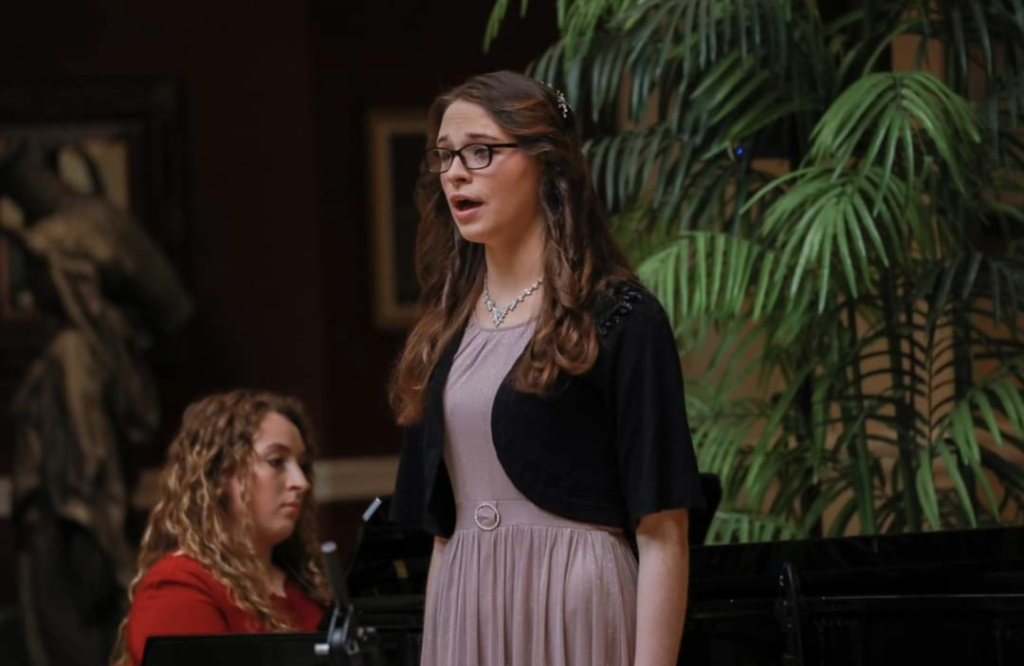They thought she might never speak; now Anna Pettit sings, reaching for a dream that at one point seemed impossible
Sitting with Anna Pettit in her grandmother’s living room, you would never know the trials she’s faced. Her mother, Amanda, had talked to me for weeks before this meeting, priming me with information on Anna’s life and the obstacles that came with it, and from the stories of Anna’s past, I readied myself in a different way for what I expected to be a challenging interview. But here she was, a twenty-year-old woman with a smile on her face, waiting patiently to begin. We had only just met, but I could see how far she’d come on her journey.
Anna was diagnosed at three years old: regressive autism, sensory integration disorder, auditory processing disorder. “It would take three of us to be able to bathe her and get her dressed and get through meals,” Amanda recalls. “People would ask if she was deaf because of that haunting blank stare.” Doctors told the family that Anna would likely never be able to speak or live a normal life.
But something began to happen as she grew. “Somewhere between the age of 6 and 8, during a movie, she began to hum,” Amanda recalls, adding, “I was so excited, I cried.” Yet, there was still a disconnect. It took many years for Amanda and her family to pierce into what she calls “Anna’s World” – the way her daughter perceives the world around her. Yet they persevered, and in time, through lifestyle changes and focused patient efforts, Anna escaped from the screaming fits and blank stares and began to respond positively to something.
That something was music.
“We either had the movies, Baby Einstein or classical music on most of the time, especially during the times where we were working on therapies with her,” Amanda says. “While these were on, she seemed to be much more alert and aware of our world and what was going on in it and seemed to feel safe enough to exit her world temporarily. She began to hum along to the songs. And at one point, I put one on and noticed immediately after hearing it, just one time, she could hum along with it, note perfect.”
It was a miracle, Amanda says, a sign that God was at work in her daughter’s life. And with that, things began to shift.

Anna’s engagement with music dovetailed with her verbal growth. Searching for an opportunity for her daughter, Amanda reached out to Dr. John Thompson, then the choir director at Crown College. “I asked him if he would consider taking her on… to kind of see what he thought, if she could possibly sing, if he could work with her, if he could help her with anything at all.” And while Thompson had never worked with a child with autism, Amanda persisted, hopeful that this would be the answer they were looking for. He agreed to run some scales with her. “After about 10 or 15 minutes he came and said, ‘This girl can definitely sing! I can absolutely work with her.'”
A few months later, Anna stood in front of a crowd, performing ‘Sweet Hour of Prayer’ at her first recital.
“He was like a first star to me,” says Anna. Her work with Thompson turned music into a passion for her, and after years of practice with him, and later his colleague Danny Griffin, she began performing at not just recitals, but at events at places like the Titanic Museum in Pigeon Forge.
While she has a remarkable range, Anna still loves Christian music most, from traditional hymns to contemporary Christian rock. Her family jokes that she’d like nothing more than to run away and tour with MercyMe, her favorite Christian band, but she says she has a different dream: “I want to make my own music someday.”
The road has been long and trying for Anna and her family, but they are proud of the woman she’s become, and Anna hopes her journey can be an inspiration to others like her. “God can use you,” Anna says. “You want to invent a video game or some TV shows or you’re good at rapping or music and [want to] use it for God, I’d encourage them.”
You can listen to Anna’s latest performance here.

Comments are closed.